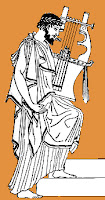Today (give or take a day) was supposed to be the beginning of the Ancient Athenian year. It was chosen because it was the birthday of the city’s patron goddess Athena. All inhabitants of the state were allowed to take part (except women and slaves) in the 4-yearly Greater Panathenaean Games – the Gayest Games in Ancient Greece.
Day One was the day for music. The city’s ruler Peisistratus (whose family are inextricably linked to the games) introduced a series of song and poetry contests to the games just after 566 BC.
Three contests took place which involved
1) singers accompanying themselves on a kithara (a kind of lyre, below left),
2) singers accompanied by someone else playing a reed instrument (below right),
3) and purely instrumental reed instrument players.
Thankfully there were no percussion instruments, so the Athenians were spared the “boom-bang-a-bang” of modern Eurovision songs camping things up. Even better, no annoying, fatuous Terry Wogan. The winners of each contest were awarded a gold olive crown and 300 gold coins – but not yet, contest winners had to wait till the end of the games before they got their prizes.
The poetry contest involved all contestants reciting a long poem, each taking a set of verses in a kind of poetry relay. Hipparchus standardised the texts for the contest, introducing the famous poems by Homer. One regular section to be recited at every games was the death and funeral of Patroclus, the best friend and lover of Achilles. Now, I don’t remember seeing Brad Pitt (as Achilles) and Garrett Heldund (as Patroclus) spending much time in bed together in the film “Troy”, unless I blinked, but they should have done if the producers expect us to take the characters seriously.
These musical contests were originally held in the agora, a market and meeting place in the centre of Athens
Given that the poems were hundreds of verses long, and given that each song and poem contest was held twice (once for adults, once for boys under 16), the contests could have lasted several days. So if you think the Eurovision Song Contest was too long, be thankful you didn’t have to sit through Day 1 of the Panathenaean games!
With the song and poem contests dragging on into Day 2, tomorrow I’ll explain a little more about why Eros and not a more macho god was the patron god of the gymnasiums and just why is was OK for Ancient Greek men to have a boyfriend.
If you want to know more about the games go to www.athens-greece.us/panathenaea


No comments:
Post a Comment